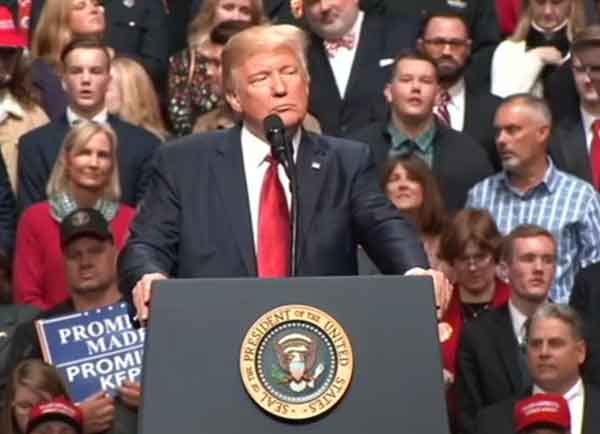The Internet is abuzz with what is being called a lifting of the propaganda ban in the United States by an amendment to the latest defense authorization bill passed by the House.
While this makes for a fantastic read by the conspiracy theorists that lurk the Internet looking for clues that our government is looking to control our minds through propaganda disseminated through our government, the amendment is far from that. To that end, it should be stated that the 1948 act does not prohibit the entirety of the Executive Branch from distributing information at home, just the State Department.
There was no intention to push propaganda materials onto the American people, but instead to lift the ban that prohibited the average American from accessing the materials produced for viewing outside of the United States. This amendment basically brings the act closer in line with Freedom of Information. Presently, the government bans certain agencies from releasing material to the American people that is already available on the web at places such as Youtube and foreign television and newspapers sources.
The United States is one of the very few nations that doesn’t allow its citizens access to what their country says abroad, we can claim China and North Korea as fellow members in that very exclusive club.
But, Buzzfeed writer Michael Hastings reports that:
“The amendment would “strike the current ban on domestic dissemination” of propaganda material produced by the State Department and the Pentagon, according to the summary of the law at the House Rules Committee’s official website.”
The story has been picked up by bloggers and news-writers across the web.
According to congressional documents the amendment seeks to amend the United States Information and Educational Exchange Act of 1948 as follows:
`Sec. 501. (a) The Secretary and the Broadcasting Board of Governors are authorized to use funds appropriated or otherwise made available for public diplomacy information programs to provide for the preparation, dissemination, and use of information intended for foreign audiences abroad about the United States, its people, and its policies, through press, publications, radio, motion pictures, the Internet, and other information media, including social media, and through information centers, instructors, and other direct or indirect means of communication.
|
|
`(b)(1) Except as provided in paragraph (2), the Secretary and the Broadcasting Board of Governors may, upon request and reimbursement of the reasonable costs incurred in fulfilling such a request, make available, in the United States, motion pictures, films, video, audio, and other materials prepared for dissemination abroad or disseminated abroad pursuant to this Act, the United States International Broadcasting Act of 1994 (22 U.S.C. 6201 et seq.), the Radio Broadcasting to Cuba Act (22 U.S.C. 1465 et seq.), or the Television Broadcasting to Cuba Act (22 U.S.C. 1465aa et seq.). The Secretary and the Broadcasting Board of Governors shall issue necessary regulations–
`(A) to establish procedures to maintain such material;
`(B) for reimbursement of the reasonable costs incurred in fulfilling requests for such material; and
`(C) to ensure that the persons seeking release of such material have secured and paid for necessary United States rights and licenses.
`(2) With respect to material prepared for dissemination abroad or disseminated abroad before the effective date of the Smith-Mundt Modernization Act of 2012–
`(A) the Secretary and the Broadcasting Board of Governors shall make available to the Archivist of the United States, for domestic distribution, motion pictures, films, videotapes, and other material 12 years after the initial dissemination of the material abroad; and
`(B) the Archivist shall be the official custodian of the material and shall issue necessary regulations to ensure that persons seeking its release in the United States have secured and paid for necessary United States rights and licenses and that all costs associated with the provision of the material by the Archivist shall be paid by the persons seeking its release, in accordance with paragraph (3).
`(3) The Archivist may charge fees to recover the costs described in paragraph (2), in accordance with section 2116 (c) of title 44. Such fees shall be paid into, administered, and expended as part of the National Archives Trust Fund.
`(c) Nothing in this section may be construed to require the Secretary or the Broadcasting Board of Governors to make material disseminated abroad available in any format other than in the format disseminated abroad.’.
(b) Rule of Construction- Nothing in this section may be construed to affect the allocation of funds appropriated or otherwise made specifically available for public diplomacy.
(c) Foreign Relations Authorization Act, Fiscal Years 1986 and 1987- Section 208 of the Foreign Relations Authorization Act, Fiscal Years 1986 and 1987 (22 U.S.C. 1461-1a) is amended to read as follows:
|
|
`SEC. 208. CLARIFICATION ON DOMESTIC DISTRIBUTION OF PROGRAM MATERIAL.
`(a) In General- No funds authorized to be appropriated to the Department of State or the Broadcasting Board of Governors shall be used to influence public opinion in the United States. This section shall apply only to programs carried out pursuant to the United States Information and Educational Exchange Act of 1948 (22 U.S.C. 1431 et seq.), the United States International Broadcasting Act of 1994 (22 U.S.C. 6201 et seq.), the Radio Broadcasting to Cuba Act (22 U.S.C. 1465 et seq.), and the Television Broadcasting to Cuba Act (22 U.S.C. 1465aa et seq.). This section shall not prohibit or delay the Department of State or the Broadcasting Board of Governors from providing information about its operations, policies, programs, or program material, or making such available, to the media, public, or Congress, in accordance with other applicable law.
`(b) Rule of Construction- Nothing in this section shall be construed to prohibit the Department of State or the Broadcasting Board of Governors from engaging in any medium or form of communication, either directly or indirectly, because a United States domestic audience is or may be thereby exposed to program material, or based on a presumption of such exposure. Such material may be made available within the United States and disseminated, when appropriate, pursuant to sections 502 and 1005 of the United States Information and Educational Exchange Act of 1948 (22 U.S.C. 1462 and 1437), except that nothing in this section may be construed to authorize the Department of State or the Broadcasting Board of Governors to disseminate within the United States any program material prepared for dissemination abroad on or before the effective date of the Smith-Mundt Modernization Act of 2012.
|
|
`(c) Application- The provisions of this section shall apply only to the Department of State and the Broadcasting Board of Governors and to no other department or agency of the Federal Government.’.
(d) Conforming Amendments- The United States Information and Educational Exchange Act of 1948 is amended–
(1) in section 502 (22 U.S.C. 1462)–
(A) by inserting `and the Broadcasting Board of Governors’ after `Secretary’; and
(B) by inserting `or the Broadcasting Board of Governors’ after `Department’; and
(2) in section 1005 (22 U.S.C. 1437), by inserting `and the Broadcasting Board of Governors’ after `Secretary’ each place it appears.
(e) Effective Date- This section shall take effect and apply on the date that is 180 days after the date of the enactment of this section.








